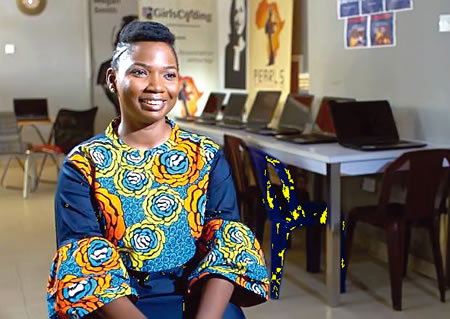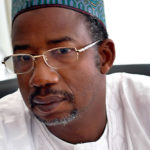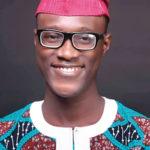It pays to look beyond self, and touch other people’s lives. Abisoye Ajayi-Akinfolarin is only 33, but her little efforts have received global recognition.
On December 9, 10 people who have looked beyond themselves and made outstanding impact on others and their environment were honoured as CNN Heroes 2018 during a broadcast beamed around the world on CNN. Abisoye was one of them.
Jonathan, Atiku, Saraki to attend Ashiru’s campaign flag off in Kaduna
Born on 19 May 1985 in Akure, Ondo State, Abisoye is a women’s rights activist, and founder of Pearls Africa Youth Foundation, a non-governmental organization aimed at educating young girls in under-served areas in Nigeria with technology skills.
On November 1 2018, she was named one of ten CNN Heroes of the Year, 2018.
Abisoye was just four years old when her mother died. Her fascination with computer started early at the age of 10, through a chance visit to her brother’s friend’s business centre.
After completing her secondary education, she attended the Nigerian Institute of Information Technology (NIIT) and, later, the University of Lagos, where she received a BSc in Business Administration.
Ms Ajayi-Akinfolarin then began her career working for E. D. P Audit and Security Associates, where she worked for seven years.
Working in technology, she discovered a large gender gap. A 2013 government survey revealed that less than eight per cent of professional, management or technological positions are held by Nigerian women. She decided to help close that gap by encouraging more women in her field.
Abisoye’s Pearls Africa Youth Foundation assists girls in developing technology skills through various programmes, including GirlsCoding, G.C Mentors, GirlsInSTEM and Empowered Hands. With GirlsCoding, a free programme, Ajayi-Akinfolarin seeks to educate girls about computer programming.
Since 2012, that organization has trained over 400 young women to code.
Speaking to CNN on her first encounter and subsequent love with the computer, she said “Learning to type and modify text in Microsoft Word was just beautiful. But I really discovered my love for computers when I joined an IT firm as an intern after high school.
“When I got introduced to the world of computer programming, I was just natural with it. It just flowed. It’s all about solving problems. I never knew that I’d be looking for solutions to problems regarding less privileged girls. That is what GirlsCoding is all about.”
Abisoye is not just teaching the girls computer programming for its sake; she wants them to be change agents. They code to solve a particular problem they have identified.
“For example, one project that I really like is called Hope Baskets. The girls wanted to get beggars off the streets, so they created a website to be a bridge between the rich and the poor.
“They wanted a way where someone can de-clutter their house and give them a call. Then they take what they’re getting rid of – food, clothing, educational materials – and give it to those in need.
“We have another project called Break the Blade, about stopping female genital mutilation. These girls believe there is a lot of ignorance about this and want to be ambassadors on this issue. Eventually, they want to have a wristband where you can press a button and it calls local authorities to come if FGM is about to take place.
“The fact that they can create solutions to problems makes them feel bold. It is no longer about just coding.”
Abisoye has gone far already; but she is not slowing down still. With GirlsCoding already spreading across different states in Nigeria, Abisoye dreams of one day having an institution called Girls Village, which will be a residential programme that provides all types of training for young girls.
She says: “We would also give them a chance to incubate their ideas about how to solve problems in their communities and learn how to pitch them. You could call it a bigger version of what we are currently doing.
“We want girls to be creators of tech, not mere users. Watching them write code is beautiful. Many of them never touched a computer before they got here. It’s mind-blowing. The joy on their faces, that’s more than money. I can’t buy it.
“One thing I want my girls to hold onto is, regardless of where they are coming from, they can make it. They are coders. They are thinkers. Their future is bright.”
Launched in 2007, CNN Heroes nominees are introduced during the fall of each year, and the audience is encouraged to vote online for the grand winner, the CNN Hero of the Year.
Ten recipients each receive USD$10,000, while the grand winner, the CNN Hero of the Year, receives an additional USD$100,000 to continue their work.
Ricardo Pun-Chong emerged the CNN Hero of the Year 2018 for his work in comforting sick kids and their families.
Other CNN Heroes for 2018 are Maria Rose Belding, for her crusade to feed the hungry; Amanda Boxtel, for helping the injured walk again; Rob Gore, for breaking the cycle of violence by teaching at-risk high school students mediation and conflict resolution; Luke Mickelson for making beds for needy children; Susan Munsey for rescuing victims of the sex trade; Florence Phillips for teaching English to America’s newcomers; Ellen Stackable for healing women inmates; and Chris Stout for ministering to military veterans in need.






